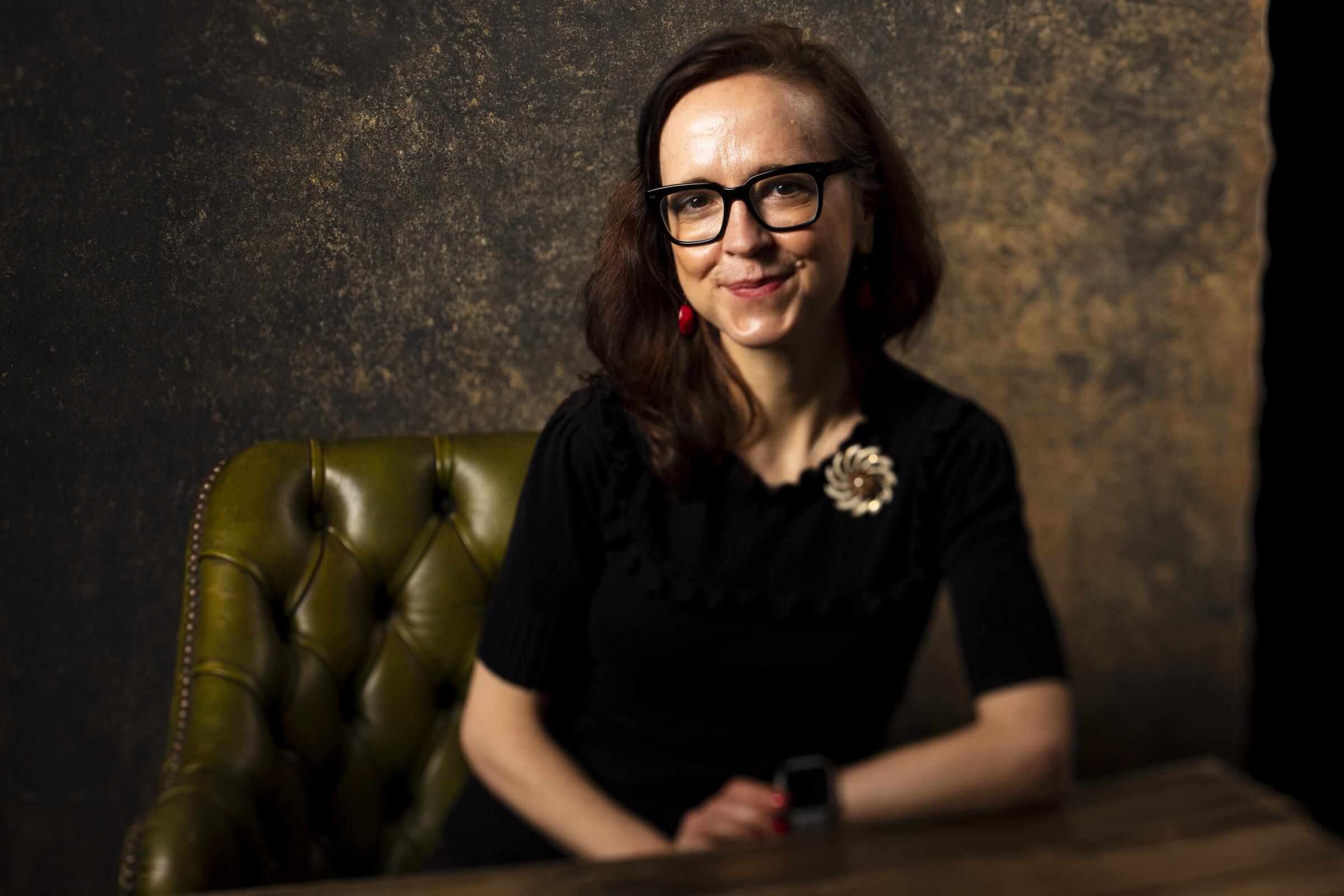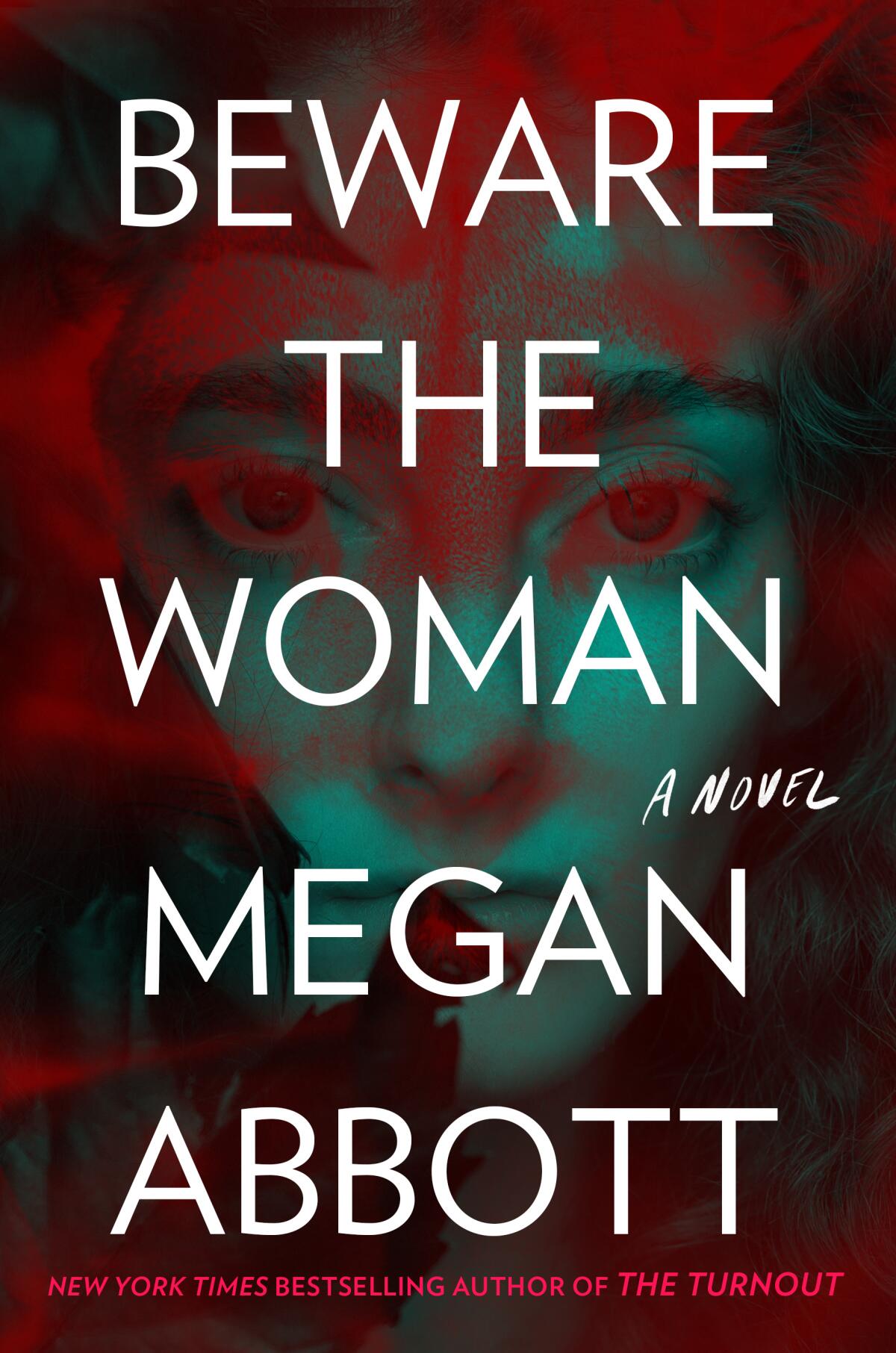Sign up for our Book Club newsletter
Get the latest news, events and more from the Los Angeles Times Book Club, and help us get L.A. reading and talking.
You may occasionally receive promotional content from the Los Angeles Times.

On the Shelf
Beware the Woman
By Megan Abbott
Putnam: 304 pages, $28
If you buy books linked on our site, The Times may earn a commission from Bookshop.org, whose fees support independent bookstores.
Megan Abbott has made a career out of probing the limits of women’s minds and bodies. In thriller after thriller, from the high-flying cheerleaders of “Dare Me” to the elite gymnasts of “You Will Know Me,” the ballet teachers of “The Turnout” to the lab scientists of “Give Me Your Hand,” she has exposed the dark underbelly of female competition.
“Beware the Woman,” Abbott’s first novel to come out after the Supreme Court overturned Roe vs. Wade, is a different beast — a “Get Out“-style horror story about a pregnant woman losing control over her own body.
“Jacy might be the most conventional character I’ve ever written, the most straight-arrow person,” Abbott says during a Zoom call from her home office in Queens, N.Y.. Young and pregnant with her first child, Jacy travels with her husband, Jed, to meet his father, Dr. Ash, in a house on Michigan’s Upper Peninsula. “When she arrives, she’s trying to figure out this family, a little community if you will.”
By the time Megan Abbott first came to Los Angeles, she had already written a book set in the city — her 2005 debut, “Die a Little.”
Little of the Ash family history is known to Jacy — or us — before we meet Jed’s father. She soon learns that Jed’s mother died giving birth to him, and as she experiences pregnancy’s expected changes, the rest of the household displays an overbearing interest in her decisions: What she eats, whether or not she can go for a walk, when she will be allowed to head back home.
As things become increasingly sinister, the narrative turns — as Abbott’s so often do — on interactions between women, in this case Jacy and a stern, somewhat mysterious housekeeper named Mrs. Brandt. But it’s hard to avoid the feeling that this creepy house at the far edge of America, where men plot to control the mechanisms of childbirth, is a stand-in for a country losing its bearings.
Abbott began writing the novel in 2021, well before the Dobbs decision came down last June. But her editor was reading the manuscript just as text alerts about the landmark case landed — and called Abbott immediately. “It was the creepiest conversation,” Abbott remembers. “It was such a chilling moment.
“I tend to write what I’m afraid about,” she continues. “We’re not always a nation of progress. Sometimes things get taken away. I was responding to the anxiety in the air that many women, including myself, were feeling about bodily autonomy.”
Most Americans support legalized abortion. But you wouldn’t know that from our popular culture, which reduced a woman’s choice to a political issue.
That anxiety long predated Dobbs. Abbott, who does not have children, was inspired to write “Beware the Woman” by the slow erosion of the right to choose as well as persistent gender disparities in medical treatment. “It’s terrifying for me that a body could become part of the state apparatus,” she says. Researching the book, she found that even medical professionals talk about women in “outrageous” ways. “If you’re pregnant, people think that they can touch you, ask personal questions about your body. You’re in danger of losing your sovereignty.”

Still, Abbott had no interest in writing an allegory full of “Brechtian mouthpieces.” “We’re all messy inside, psychologically,” she says. “People aren’t always consistent about their beliefs in their private behavior. I’m no Cassandra. I didn’t predict this turnaround. But in a moment where your worst fear is brought home, you realize that your anxieties have been speaking to you all along.”
She is also a novelist driven by research. In order to understand dance studios and locker rooms and the stages of pregnancy, Abbott headed where the rest of us often do: online — to message boards and Reddit and YouTube. “My research is kind of voyeuristic,” she says. “And the comments are where you find the most telling stuff. But I also talk to people a lot. I talked to so many cheerleaders, for instance, because what you get from that talk that you can’t get anywhere else is their attitude toward things, like how proud they are of their surgical X-rays, of their sport-induced wounds.”
In comparison to such high-flying acrobats, Jacey should feel a lot more stable and safe; in fact, she is in great danger. “The notion that Jacy’s body might be controlled by other people feels bigger and scarier,” Abbott says, than the threat of any self-inflicted injury. “There’s so much that still feels so taboo with women. Certainly 10 or 15 years ago when I started writing these books, there was so little in crime fiction about the reality of female bodies.”
Ivy Pochoda’s previous thriller turned the focus on a killer’s female survivors. Her new one, ‘Sing Her Down,’ explores the depths of women’s rage
A self-described feminist, Abbott says she has “very firm ideologies, but I don’t write from an ideological place. You turn off different parts of your brain to do different things, and I can’t write from my own perspective alone or I couldn’t have characters that work in suspense. You have to just take a chance and write the story as it unfurls.” She says that in our current environment, that practice felt “particularly fraught.”
Another topic currently activating Abbott’s ideologies is the Writers Guild of America strike. Abbott, a longtime WGA member who has written for the HBO series “The Deuce” and USA Network’s “Dare Me” (the latter adapted from her novel), believes the negotiations will determine our continued ability to create and consume stories from a wide array of perspectives.
“I try to be careful about writing different experiences in my own books,” she says, “but when you’re writing for the screen you will inevitably be writing dialogue for all kinds of characters, because you’re writing everyone’s dialogue. It’s one of the reasons you need the writers room. … There are no shows without writers, but more important to me is that these shows reflect the breadth of human experience, and you can’t do that with just a single writer.”
Notwithstanding her Hollywood work, Abbott has never lived in California — and she confesses that, for her, Los Angeles is primarily a city of the imagination. “It developed from movies and books,” says Abbott, who grew up in Grosse Pointe, Mich., and received her doctorate in English from the University of Michigan, where her dissertation focused on that most Angeleno of genres, noir: “That light and dark glamour and dread in the best noir contains all sorts of extremes.”
The 13 most essential L.A. crime books — from Chandler, Hughes, Mosley and Ellroy to Steph Cha and Ivy Pochoda, with some ‘Helter Skelter’ in between.
Abbott’s thrillers have often set dark deeds against familiar suburban locales. But “Beware the Woman” takes place in a part of her home state she finds just as alien as Nathanael West’s haunted Hollywood Hills.
“The Upper Peninsula has some of the same extremes that Los Angeles does,” she says, “because it’s so beautiful and it’s like the end of the Earth. You feel like you’re in this sort of liminal space between civilization and everything else.”
To a girl growing up in the Michigan suburbs, the land across the lake “had this sort of spooky, exciting quality because up there everything felt hidden,” she says. “It was in Michigan, but not of Michigan. Maybe it wasn’t even exactly of America.”
For her next project, though, Abbott will get closer to home. “My new novel will be set in Grosse Pointe,” she reveals. “There’s a lot of crime in it!” And this time, she will focus on characters near her own age.
Might menopause noir be Abbott’s next move? She laughs. “I can say no more, except that hopefully I’m an early adopter.”
Patrick is a freelance critic, podcaster and author of the memoir ”Life B.”
Sign up for our Book Club newsletter
Get the latest news, events and more from the Los Angeles Times Book Club, and help us get L.A. reading and talking.
You may occasionally receive promotional content from the Los Angeles Times.